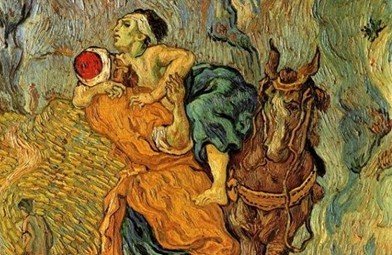Reading Luke Together #31 – Love of God & Neighbor
I’ll never forget the light bulb popping on in my head when I backed away from Luke 10:25-42 and, instead of poking around verse by verse, I looked at the larger sequence – and noticed Luke’s genius as a theologian and presenter of Jesus.
A lawyer (and I suspect they had lawyer jokes back in Bible times too!) stood up (why? Was he asserting his smarts?) to test – to bait Jesus. No easy road for Jesus, constantly harassed by critics, scoffers, fault-finders. Asked how to come by eternal life, Jesus (typically) puts the question back to the baiter, who answers well, quoting (as Jesus did at other times) Deuteronomy 6 and Leviticus 19: “Love God, love your neighbor.”
Was he proud Jesus affirmed his reply? Or nervous, based on Jesus’ habit of overturning accepted wisdom? Bishop Robert Barron: “All of religion is finally about awakening the deepest desire of the heart and directing it toward God; it is about the ordering of love toward that which is most worthy of love.” What does God want? Fear? Obedience? Usage?? No, God wants (like the rest of us with hearts) love.
Okay, love God, and love my neighbor! I get it. But instead of leaving well enough alone, the lawyer asked – “desiring to justify himself,” our common, pathetic human desire! – “Who is my neighbor?” It feels like he hopes to limit the definition to those in his physical neighborhood, or those he likes, or those like him, or the “good” people who deserve love and help.
Jesus replies (typically again) with a story, not some pointed instruction. The neighbor is illustrated in one of Jesus’ most memorable stories: the Good Samaritan. We hear the term “good Samaritan” as anybody who does good for others, especially the needy – and in so doing, we miss the shock, the affront of Jesus’ startling reply. “A man was going down from Jerusalem to Jericho” – and it is down, way down, from 2,474 feet above sea level to 836 feet below sea level, in just 18 miles! Steep those roads!
Robbers not only stole from him, but stripped and beat him, humiliating and nearly killing him. “Left half dead.” A priest, and then a Levite, holy men, committed to keeping their hands clean, scoot on by, as expected of such pure people. But then it’s a Samaritan, far from his own land, despised, loathed even by the priest, Levite, those hearing the story, and even the guy beaten up and left half dead, who stops, helps – and extravagantly, going to all the trouble to get him to the inn, and pay for this total stranger’s stay and assistance.
Neighbor? The Samaritan? The Jew the Samaritans didn’t like either? They avoided one another more than the plague or the despised Romans or tax collectors. I used to say The guy with AIDS. Now I think it’s the Republican, the Democrat, the immigrant, the black protestor, whoever rubs you wrong.
To quote Paul Ricoeur, ”One does not have a neighbor; I make myself someone’s neighbor.” Neighbor is an active seeking of whoever is hurting, whoever is different. G.K. Chesterton shrewdly noticed that “St. Francis seemed to have like everybody, but especially those others disliked him for liking.” Do you like anybody others dislike you for liking?
4th century theologian St. John Chrysostom wrote that “The inn is the church.” We are to welcome wounded travelers, those despised and hurting. Mother Teresa wonderfully said “We do not ask why they are poor or hurting. We simply love them, and by loving them, we love Jesus.” Jesus answered the inquiry “Who is my neighbor?” by this remarkable story that shatters every border of who’s to be helped and who’s not to be helped, and how unlimited our generosity can and should be. It’s love for God, really.
In our next email, we ponder the rest of the story: how Jesus reveals not just who’s the neighbor we’re to love, but how to love God.
